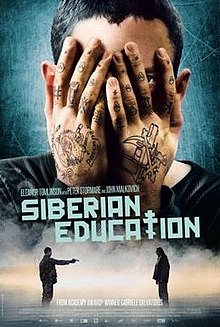|
Siberian Education
Siberian Education (known as Deadly Code in the United States;[1]) is a 2013 Italian crime-drama film directed by Gabriele Salvatores. The film was nominated to 11 David di Donatello awards, including Best Film and Best Director.[2] Mauro Pagani won the Ciak d'oro for Best Score.[3] ProductionThe movie is based on the allegedly autobiographic novel with the same name written by Nicolai Lilin,[4] the pen name of Nikolai Verzhbitsky.[5] Many of the actors, especially child actors, are Lithuanian. Winter scenes were also shot in Lithuania (instead of the actual Russia). All other scenes were shot in parts of Italy. The movie itself was filmed in English, with Italian subtitles.[6][7] The finale was changed after a test screening with an audience in London.[7] Lilin's novel was never published in Russia because the author allegedly banned the sale of rights to it in the country.[8] Kommersant's journalist Elena Chernenko investigated the story by Lilin and proved that it was an auto-fiction as multiple historical facts as well as time spans didn't add up.[5] PlotKolyma[a] and Gagarin[b] are two boys in an ethnically Siberian village[c] in Transnistria being raised by Kolyma's grandfather Kuzja.[d] Kuzja imposes a very strict education to the children, focusing on hatred of the Soviet officials such as bankers or the military, which are regarded as enemies. Following one of their robbery attempts against the Soviets[clarification needed], Gagarin is captured, tried and imprisoned. Seven years later Gagarin is freed, but he discovers that his world has completely changed and he does not know how to succeed in solving his problems. Gagarin finally discovers that the ideals of his people have collapsed in the drug trade, so he enters into this new system but he ends up in conflict with Kolyma.[9] Cast
ReceptionSiberian Education received mixed to positive reviews. James Luxford from The National (UAE) gave to the film a score of 3/5 writing: "Sombre and grim, this coming-of-age tale keeps the scale small but the issues big, hinting at wider questions of good and evil in the world, but an inability to offer truly memorable moments creates a ceiling artistically". He also appreciated Salvatores' script and Malkovich's performance.[10] Catherine Brown from Filmink praised the film saying that:" Despite its faults, the film is worth viewing not only for Malkovich's brilliant performance".[11] The Hollywood Reporter gave to the film a positive review calling it: "[...] a strong piece of exotica".[12] Lee Marshal from Screen Daily praised the lush photography and convincing lead performance, but noticed that generally the story didn't feel authentic and the heavy accented dialogue is difficult to be taken seriously.[13] FootnotesReferences
External links |
||||||||||||||||||||||||||
Portal di Ensiklopedia Dunia
